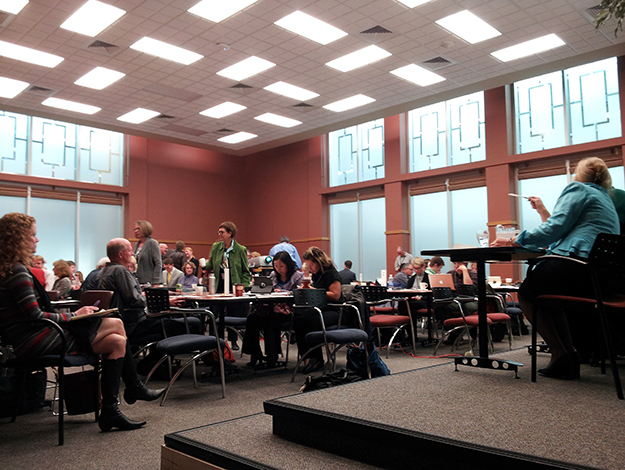FEED Summit offers new perspectives on teaching and learning

Gilmour Hall was buzzing with activity last Friday, as a wide range of educators, university staff, administrators and student leaders from across Ontario converged on campus for the Faculty Engagement in Educational Development (FEED) Summit. The event was moderated by Arshad Ahmad, McMaster's associate vice-president, Teaching and Learning.
How do universities encourage faculty to embrace new teaching methods and grow as educators, while also ensuring these efforts are recognized alongside research and service endeavours?
That was the overarching theme of the Faculty Engagement in Educational Development Summit, also known as FEED, which took place Friday in Council Chambers.
Attendees were asked to consider a number of different questions during the session, including: what impact would mandatory educational development have in Ontario universities, and what are some creative and feasible incentives that could be offered to faculty for attending educational development programs?
The day-long session was co-hosted by the Council of Ontario Universities, the Council of Ontario Educational Developers and McMaster University, and was moderated by Arshad Ahmad, McMaster’s associate vice-president, Teaching and Learning.
“McMaster is an ideal host to attract so many leaders from the 20 Ontario universities that participated,” explained Ahmad. “The University has a long history of supporting innovation in learning and teaching, and I am thrilled to have our own McMaster Institute for Innovation and Excellence in Teaching and Learning (MIIETL) staff, Kris Knorr and Lori Goff, co-chairing the Council of Ontario Educational Developers right here on campus.”
The event brought together a wide range of educators, university staff, administrators and student leaders from across Ontario to discuss some of the most pressing issues facing postsecondary teaching and learning.
“We always hire great researchers, but what can we do to help them develop on the educational side as well?” said Goff, MIIETL educational consultant and one of the coordinators of Friday’s event. “Our hope is that, by the end of the summit, we’ll have started some discussions on developing a postsecondary educational model in Ontario.”
As part of the day’s proceedings, Christopher Knapper, a professor emeritus from Queen’s University, delivered a video keynote entitled, “The Impact of Training on Teacher Effectiveness: Canadian Practices and Policies.” The taped interview was followed by a six-person discussion panel dissecting some of the hot-button issues surrounding teacher training.
Deb Dawson, director of the Teaching Support Centre at Western University, called the push for university teacher training a “no brainer,” but stressed that each institution should be able to design its own teacher training programs.
“It’s important to have some local context, and not take a ‘cookie cutter’ approach across the province,” said Dawson. “We also need to consider that we also have the potential to reach all new faculty now, not just tenure-track professors, through a number of online resources.”
Others, such as Durham College’s Chris Hinton, stressed a need for educators to evolve with new technologies and accessibility guidelines.
“There’s a real need to have lifelong learning and growth as educators,” said Hinton, director, Centre for Academic and Faculty Enrichment at Durham College. “Growth also needs to happen in terms of our technical teaching and learning resources, especially with new legislature such as the AODA (Accessibility for Ontarians with Disabilities Act) coming into play. Students are shifting from ‘consumers’ to ‘producers’ of knowledge, as more and more bring their own devices to class.”
Offering a perspective from abroad, Celia Popovic — director, Teaching Commons at York University and a longtime postsecondary educator in Britain — said that many institutions overseas are tackling the same issues found in Canada. She stressed, however, that there has been a “major acceleration” in the number of teacher training programs offered in the U.K., with many of the programs being a mandatory requirement for new faculty.
Other panelists included: Andrea Buchholz, academic lead of the EnLITE program at the University of Guelph; Joy Mighty, associate vice-president (Teaching & Learning) at Carleton University; and Kate Lawson, president, Ontario Confederation of University Faculty Associations.

